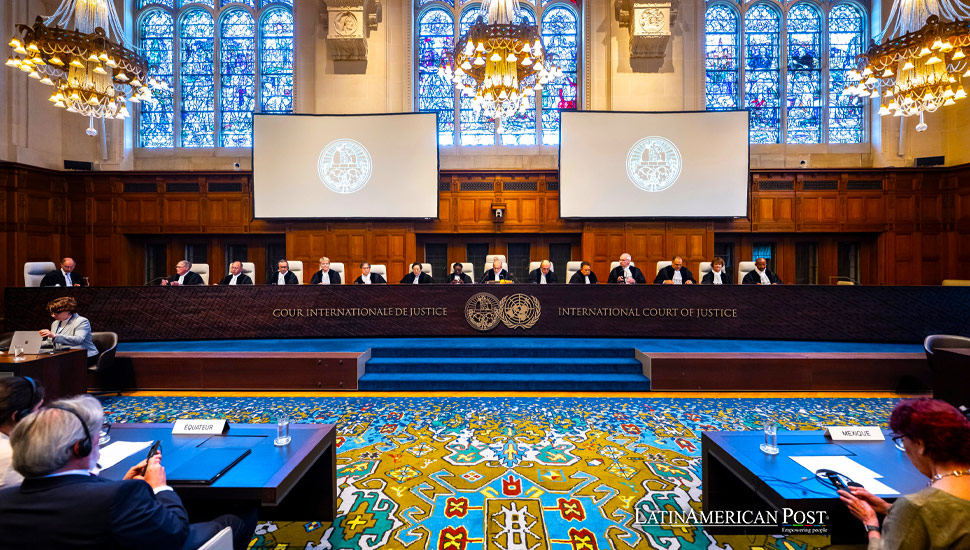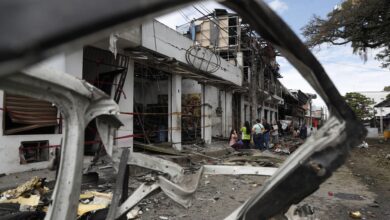Diplomatic Standoff: ICJ Denies Mexico’s Request to Protect Embassy

Mexico’s demands for Justice (ICJ) have denied Mexico’s request to emerge. The move comes with measures to protect its embassthatEcuador, amid a diplomatic conflict involving the arrest of Ecuador’s former Vice President Jorge Glas, escalating tensions between the two countries.
In a significant ruling, judges at the International Court of Justice (ICJ) on Thursday rejected Mexico’s plea for emergency measures to safeguard its embassy in Ecuador. This decision comes amid an intense diplomatic dispute that led Mexico to sever ties with Ecuador. The root of the conflict lies in the dramatic arrest of Ecuador’s former Vice President Jorge Glas, who had sought refuge in the Mexican embassy in Quito since December.
The diplomatic clash between Mexico and Ecuador reached the ICJ after both nations filed lawsuits against each other. Mexico accused Ecuador of violating international law by breaching its embassy to arrest Glas. At the same time, Ecuador countered by accusing Mexico of illegally granting asylum to a twice-convicted politician facing new corruption charges.
Jorge Glas, a prominent figure in Ecuador’s political landscape, was arrested in April under contentious circumstances. His presence in the Mexican embassy was a point of contention, with Mexico insisting that its diplomatic premises were violated, breaching international diplomatic protocols. On the other hand, Ecuador argued that granting asylum to Glas was an overreach of Mexico’s diplomatic rights.
ICJ’s Ruling and Its Implications
Mexico sought emergency measures from the ICJ to protect its embassy and the residences of its diplomats in Ecuador. However, ICJ presiding judge Nawaf Salam ruled that Ecuador had already committed to protecting Mexican diplomatic premises, and therefore, there was no immediate need for additional court orders.
“The court’s rejection of Mexico’s request confirms the unnecessary character of the request,” Ecuador’s foreign ministry stated following the ruling. The ministry emphasized that the court recognized Ecuador’s good faith and determined that the current circumstances posed no risk to Mexico’s rights.
They acknowledged the court’s decision through a video message from legal consultant Alejandro Celorio Alcántara, Mexico’s foreign affairs ministry. Although the provisional measures requested by Mexico were not granted, the affirmation that the inviolability of diplomatic premises is absolute was seen as a positive outcome. According to the Mexican president, this ruling sets a precedent ensuring that embassies cannot be invaded, highlighting the ruling’s broader implications for global diplomatic relations.
Historical Context of Diplomatic Asylum in Latin America
The concept of diplomatic asylum has deep roots in Latin American history. It often serves as a political tool during times of upheaval and conflict. Historically, embassies in Latin America have been safe havens for political dissidents and persecuted individuals. The tradition of granting asylum dates back to the early 19th century and has played a crucial role in the region’s political dynamics.
Latin American countries have frequently used diplomatic asylum to provide refuge to individuals facing political persecution or legal charges perceived as politically motivated. This practice has sometimes led to diplomatic tensions, as seen in the current dispute between Mexico and Ecuador.
The arrest of Jorge Glas within the Mexican embassy highlights the delicate balance between respecting diplomatic immunity and enforcing national laws. While diplomatic asylum protects individuals from unjust persecution, it can also lead to allegations of harboring criminals, as demonstrated in this case.
Broader Implications and Future Prospects
The ICJ’s decision is pivotal in the ongoing diplomatic standoff between Mexico and Ecuador. While the immediate request for emergency measures was denied, the court’s affirmation of the inviolability of diplomatic premises underscores the importance of adhering to international diplomatic protocols.
This ruling could influence how diplomatic disputes are handled, particularly in Latin America, where political asylum within embassies remains contentious. The decision also highlights the limitations of international legal mechanisms, as ICJ rulings, while legally binding, lack direct enforcement power.
The ongoing trial at the ICJ could take years to resolve, during which both nations will continue to navigate the complexities of their diplomatic relations. Meanwhile, an Ecuadorian court’s ruling that, despite the illegal nature of Glas’s arrest, he must remain in jail due to his prior convictions adds another layer of complexity to the situation. Glas’s legal team has pledged to appeal, indicating that the legal and diplomatic battles are far from over.
The Role of International Courts in Diplomatic Conflicts
The ICJ, also known as the World Court, is crucial in resolving disputes between nations, particularly those involving international law and diplomatic relations. Although not enforceable, its rulings carry significant weight and influence international norms and state behavior.
In this case, the ICJ’s involvement underscores the importance of diplomatic immunity and the protection of embassies. While reaffirming the principle of inviolability, the court’s decision to deny Mexico’s request for emergency measures reflects a nuanced approach to balancing state sovereignty and diplomatic protection.
Latin American Context and Regional Reactions
Latin America has a history of political turbulence and diplomatic conflicts. Many countries in the region have experienced periods of authoritarian rule, political persecution, and economic instability. The region’s legal and diplomatic frameworks have evolved to address these challenges, often emphasizing human rights and international cooperation.
The diplomatic row between Mexico and Ecuador is not an isolated incident but part of a broader pattern of regional disputes. It highlights the need for robust diplomatic channels and legal frameworks to manage conflicts and uphold international law. Regional organizations like the Organization of American States (OAS) often mediate such disputes, promoting dialogue and resolution.
We will closely watch the reactions of other Latin American countries to the ICJ ruling and the ongoing diplomatic dispute. The precedent set by this case could influence how future diplomatic conflicts are managed, particularly those involving asylum and the protection of diplomatic premises.
The International Court of Justice’s rejection of Mexico’s request for emergency measures to protect its embassy in Ecuador marks a significant development in the ongoing diplomatic dispute between the two countries. This ruling reaffirms the principle of diplomatic inviolability while highlighting the complexities of international law and diplomacy.
As Mexico and Ecuador navigate this challenging diplomatic landscape, the implications for Latin American diplomacy and international relations will become increasingly evident. The case serves as a reminder of the importance of adhering to international norms and the need for effective legal mechanisms to resolve disputes.
Also read: Mexico Requires $400 Billion Investment by 2032 to Maximize Nearshoring Opportunities
The outcome of the ongoing trial at the ICJ will be closely watched, not only for its impact on Mexico and Ecuador but also for its potential to shape international diplomatic practices and legal standards. In the meantime, the diplomatic and legal battles surrounding Jorge Glas’s arrest and asylum will continue to unfold, providing further insights into the interplay between national sovereignty and international law.




